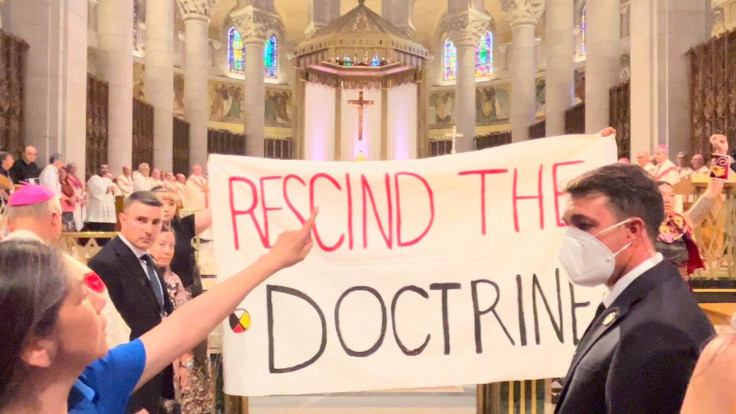Pope Again Asks For Forgiveness As Tour Ends In Canada's North

Pope Francis again asked for forgiveness after meeting on Friday with residential school survivors in the Arctic territory of Nunavut, the last stop in his six-day visit to Canada to apologize to indigenous people for abuse in government schools run by the Roman Catholic Church.
After a private meeting in a small elementary school, Francis said hearing survivors' stories had "only renewed in me the indignation and shame that I have felt for months" at the harm done to them. His plane departed Canada for Rome on Friday evening.
Earlier on Friday, the pontiff told indigenous leaders in Quebec City that he was pained that Catholics had supported "oppressive and unjust policies" against them.
Francis capped his week-long tour in Iqaluit, Nunavut's capital, a city of 7,700 that sits among rocky hills overlooking Frobisher Bay. Iqaluit, in the Arctic territory created in 1999 for the Inuit people, is reachable only by plane or ship.
"Today too, in this place, I want to tell you how very sorry I am and to ask for forgiveness for the evil perpetrated by not a few Catholics who contributed to the policies of cultural assimilation and enfranchisement in those schools," said Francis, atop a stage designed to look like a qammaq, an Inuit summer home.
A small crowd watched the pontiff's speech, which was preceded by performances of Inuit traditional throat singing and drum dancing.
Jack Anawak, one of a few Inuit leaders who started raising awareness of the abuses of northern children 32 years ago, said the Canadian government or Catholic church should provide more money for programs to support survivors.
"We have arrived today where the pope is addressing those very concerns," Anawak said. "Their load will lighten (after the apology), but the trauma they feel will still be there and they'll need help."
Tanya Tungilik, whose late father Marius Tungilik said he was abused by Roman Catholic priests, hoped to ask Francis to help bring to justice clergy members who abused children, along with those who hid their crimes.
"I want to tell him the full effects of what his church has done to my father and to my family," Tungilik said.
More than 150,000 indigenous children were separated from their families and brought to residential schools, which operated between 1870 and 1996.
Catholic religious orders ran most of the schools under successive Canadian governments' policy of assimilation.
The children were beaten for speaking their native languages and many were sexually abused in a system Canada's Truth and Reconciliation Commission called "cultural genocide."
"His apology is accepted and from this point on we will start healing and take our life back," said Andre Tautu, 79, who said he was sexually abused in the church and elsewhere by Catholic clergy in Chesterfield Inlet, Nunavut. "Hopefully, our children will never, ever receive this kind of treatment like we did when we were little kids."
Tautu, part of a small group that greeted the pope at the Iqaluit airport, said he turned to alcohol to deal with his trauma and mistreated his children. He has asked them to forgive him.
"I don't have many more years to live, so I want to make sure my wife and children are happier in the future," Tautu said.
CALL FOR PRIEST'S EXTRADITION
The pope on Monday traveled to the Alberta town of Maskwacis, the site of two former schools, and issued a historic apology that called the Church's role in the schools, and the forced cultural assimilation they attempted, a "deplorable evil" and "disastrous error."
His pleas for forgiveness evoked strong emotions for many but fell short of what some survivors and indigenous leaders hoped for.
Since then, the pope has built on the apology, referring to both institutional failures and sexual abuse in subsequent speeches -- addressing some of the grievances raised by survivors.
Tungilik and others specifically want the pope to pressure France to extradite retired priest Johannes Rivoire, who faces a Canadian charge of sexually assaulting a young girl in the 1970s, and allegedly others, including Marius Tungilik.
Canada's Justice Department confirmed this week that it has asked France to extradite Rivoire. Prime Minister Justin Trudeau's office has said that he discussed the Rivoire case with the pope during his private meeting on Wednesday.
Natan Obed, president of Inuit Tapiriit Kanatami, a prominent Inuit organization, said the pleas did not appear to move the pope to action.
"The pope himself has not responded to any of the requests we have made, although he has looked sympathetic," Obed told Reuters. "We have asked multiple times and the request was made in the private event today. No resolution to date."
© Copyright Thomson Reuters 2024. All rights reserved.











